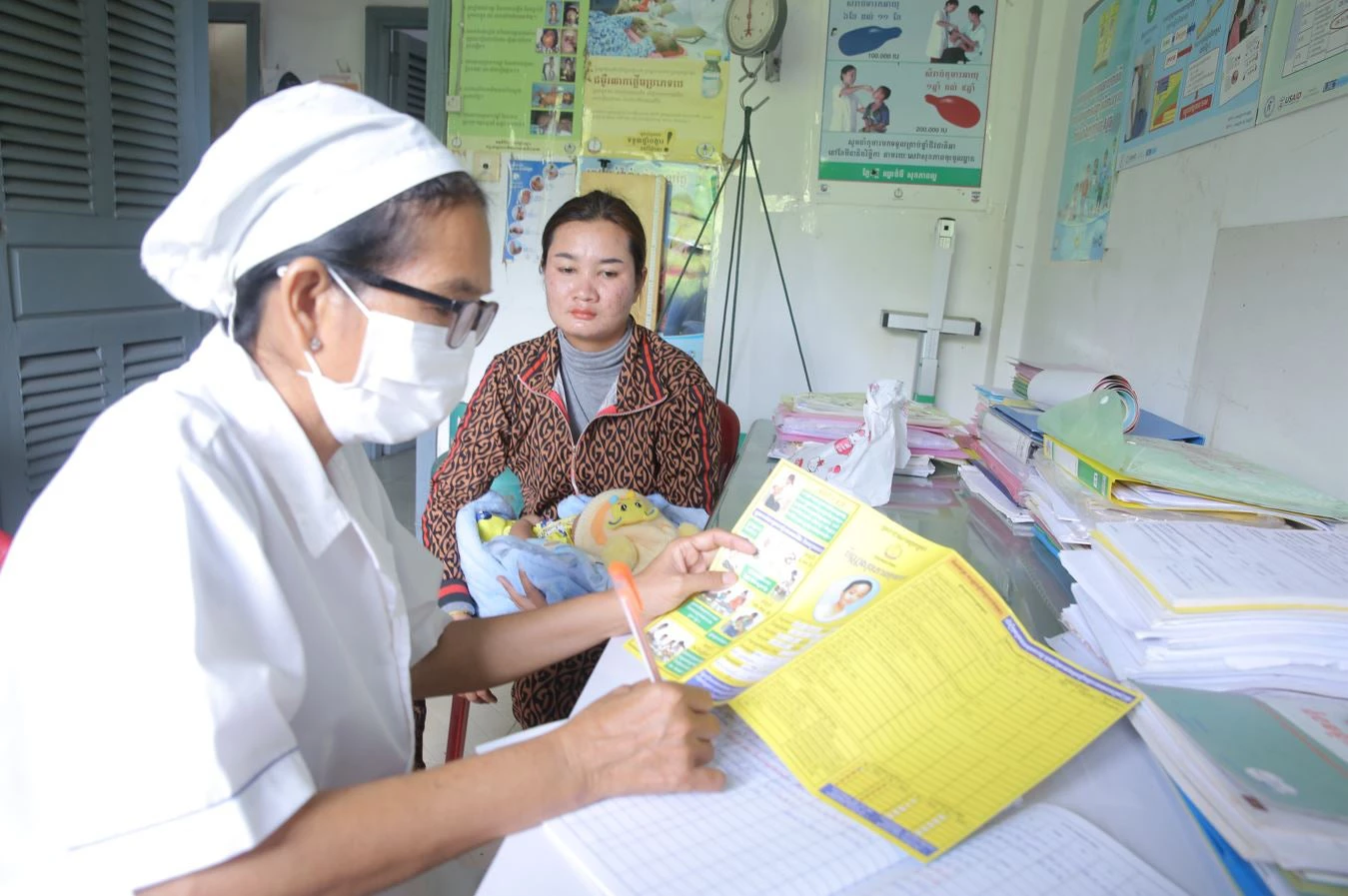 Family planning services are offered to patience at the Banlong Health Center in Chey Chumnas village in Ratanakiri province. (Photo: Dominic Chavez/Global Financing Facility)
Family planning services are offered to patience at the Banlong Health Center in Chey Chumnas village in Ratanakiri province. (Photo: Dominic Chavez/Global Financing Facility)
When I first moved to Cambodia in 2019, I was impressed with the country’s success in developing its health systems and improving health outcomes for its population. The mortality rate decreased by half from 351 deaths per 100,000 live births in 2005 to 160 in 2019. Cambodia has also made substantial economic gains, reaching lower-middle income status in 2015, while making steady progress towards achieving Universal Health Coverage (UHC). But one thing still perplexes me. With such successes, why do many Cambodians still seek medical care abroad, incurring significant financial burdens on themselves?
I explored the question with the Ministry of Health (MOH) and arrived at a simple answer — there are just not enough qualified health professionals. Currently, Cambodia has only 1.4 doctors and 9.5 nurses and midwives per 10,000 people. This is significantly below the average of 9 doctors and 19 nurses per 10,000 people among low- and lower-middle income countries in the East Asia and Pacific region. The gap is particularly noteworthy in the public sector, including in public hospital and other government institutions—only 30% of graduates from health training institutions enter it each year. Disparities in geographical distribution, gender and ethnic balance, and equity across professional groups exacerbate this gap. Moreover, an MOH nationwide assessment of the competency of doctors, nurses, midwives, and laboratory technicians at health centers and hospitals found large variations in quality across different types of services.
Pre-service education to increase health care capacity
Clearly, a reform of medical education is needed to boost the country’s health care capacity. But increasing the size of the health workforce alone will not do the job. To lift the quality of health care services, pre-service education to provide better training to health professionals before they enter the workforce is critically important. The Lancet Global Commission on High Quality Health Systems has identified the transformation of the health workforce, and in particular, strengthening pre-service education and supporting work environments, as one of the four ‘universal actions’ to increase quality across health systems.
Health care professionals’ training is central
However, Cambodia faces several challenges to providing quality pre-service education, including weak governance and regulation, a mismatch between the competency of graduates and the population’s health needs, outdated curricula, poor quality of instruction, ineffective use of practice sites, inadequate facilities and equipment, and poor assessment of students and programs. Improving the quality and regulatory functions of the system for educating health professionals will be pivotal for enhancing Cambodia’s growing health care system.
The good news is that the government of Cambodia has started addressing this through its Health Workforce Development Plan (2016–2020) and the recently developed the National Strategic Plan for Pre-service Education in the Health Sector in Cambodia (2020–2025). The latter aims to shift the education of Cambodia’s health professionals from a knowledge-based to a competency-based system, which will comply with standards set by the Association of Southeast Asian Nations (ASEAN) and other international bodies. Other priority areas include ensuring quality of pre-service education programs, strengthening capacity of institutions, ensuring improved student assessment, and ensuring that licensing systems for health professionals are robust.
What’s in store for the next generation of aspiring health professionals?
The government has also been implementing a human capacity building project supported by the World Bank, the German Development Bank KfW, and other development partners, to improve the quality of education for health professionals entering the workforce in response to health system needs.
This project aims to improve the governance of health professionals’ education in Cambodia by establishing a regulatory framework to set education regulations and standards as well as by measuring educational outcomes. This will include developing and strengthening regulations, standards, and guidelines for the governance of health professional education; supporting the establishment and operationalization of a national competency-based exit exams center; and providing technical assistance and knowledge exchange on health professional education. Given the complexity of the operation, the Ministry of Health may need international technical assistance and knowledge exchange. Expert groups comprising international and national experts will help Cambodia formulate regulations and quality assurances for health professionals.
In selected health training institutions, the program will target faculty development courses, intensive coaching from experts, enhanced infrastructure, technology, and other resources to support new ways of teaching across six health professional programs: general medicine, dentistry, pharmacy, nursing, midwifery, and laboratory. Gender aspects and social inclusiveness will be mainstreamed in the development and delivery of these competency-based training programs.
Lasting benefits
The new competency-based curriculum and effective teaching corps promise to produce a competent health care workforce that will change the landscape of health care in Cambodia. Not only will is the project expected to have a positive impact on the careers of health professionals enrolled and trained under its programs, but it will also lay a stronger foundation to lift the country’s health care capacity so that Cambodians will no longer feel the need to seek treatment elsewhere.


Join the Conversation